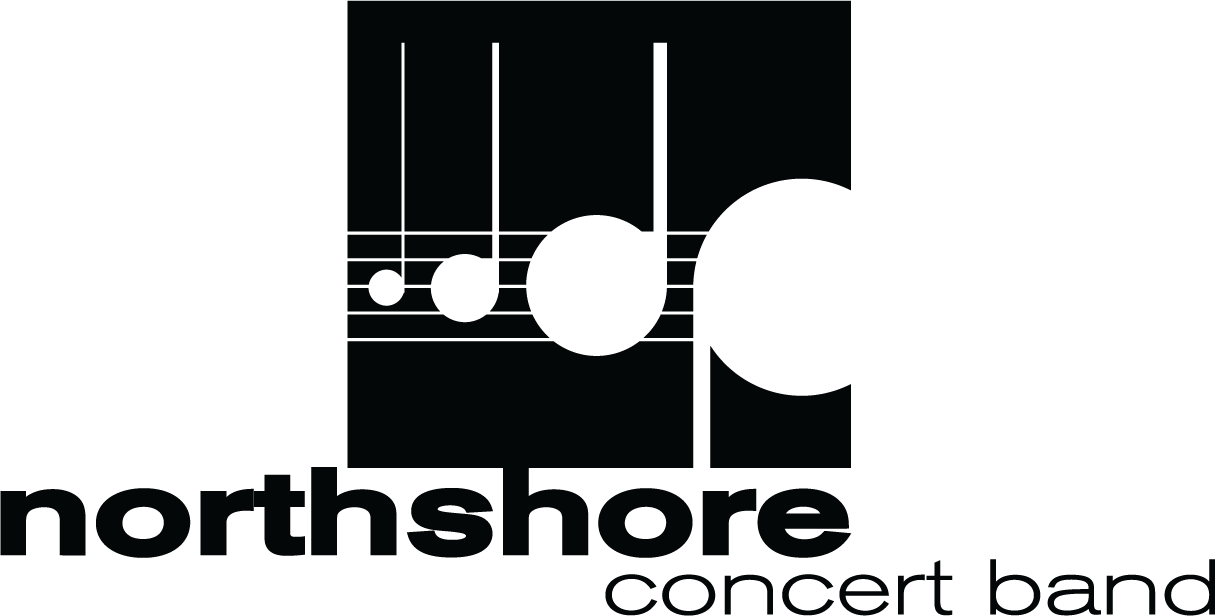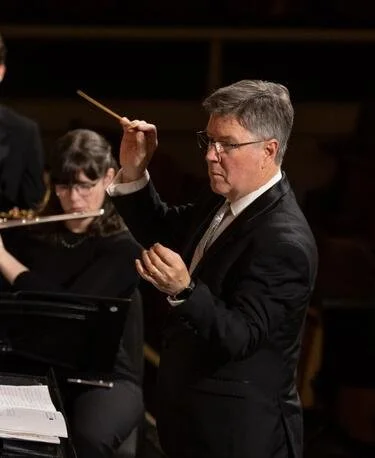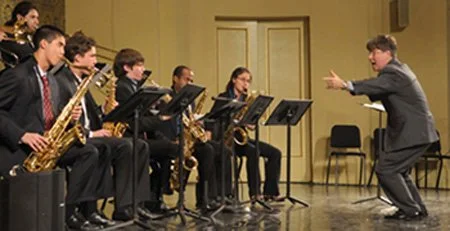Composer Thomas Duffy
A+ March by composer Thomas Duffy is a highlight of our February 19, 2023 Lifetime of Music concert. This work was first performed by NCB on February 9, 2014 during our 2013/14 Season Lifetime of Music concert.
Dr. Duffy describes this work:
There is much debate about the value of the performing arts in the pre-college curriculum. This debate rages most furiously when budget considerations make cut-backs inevitable, and the academic money managers propose to snip away at the non-core curricular "activities" such as art and music performance and, in some cases, athletics. This short piece makes the case for the unique importance of music performance curricular or non-curricular in every academic program.
Grades allege to represent achievement. There is a quantitative correlation between grades and performance, with grades often being assigned to reflect the percentage of correct or appropriate responses or behaviors. Average grading scales include the grades A, B, C, D, and F, with gradations of these levels being subdivided by pluses and minuses. Roughly, F corresponds to grades of 59% and lower; D corresponds to 60 to 69%; C corresponds to 70 to 79%; B corresponds to 80 to 89%; and A corresponds to 90 to 100%. The higher and lower areas of the grading ranges are reflected by + and -. The unique grade of A+ is awarded for achievement in the area of 97 to 100%. This means that, in the sciences and humanities for example, the highest possible grade can be awarded to work or achievement that contains up to 3% error! A+= 97%; 3% short of perfection!
Can you imagine a musical performance with even 1% error, never mind 3%? Most musical performances are flawless in execution in certain domains — pitch, rhythm, dynamics, for example. Think how greatly one wrong note sticks out of an orchestral or band or choral performance! Music performance routinely demands one hundred percent accuracy in execution. Music performance is unique in that regard. Is there another discipline in the academic curriculum that makes such high demands on students?
A+: A "Precise" Prelude and An "Excellent" March makes a case for the high quality of music performance. The Prelude, if performed well, is precisely imprecise, with tendrils of harmonic material floating around at the whim and fancy of the woodwinds. The March is a simple little commencement-like processional which is repeated. The ensemble players are instructed to make one mistake in the repetition-a mistake of pitch or dynamic or rhythm or articulation — it's their choice. There are 8,665 notes in this piece. If the ensemble consists of 60 players, all of whom make one pitch mistake, the percent of error is .69 of 1 %, that is-not even 1%! If one considers that each note has a dynamic, articulation, and rhythm component (all of which can be mutilated!), the possible execution opportunities become 8,665 pitches multiplied by three (dynamics, rhythm, articulation) for a total of 25,995! One mistake by each member of a 60-piece ensemble now represents only .023 of 1%! In fact, 3% error in this case would equal 779 mistakes — a rate of performance that would qualify for an A+ in the academic world but would probably result in the conductor of the ensemble receiving a pink slip or the request for career counseling before the last notes' reverberations ceased! Nevertheless, by all academic standards, the performance of this march, with anything less than 779 mistakes, will be "excellent."
Thomas Duffy is a composer, conductor, and Director of Bands at Yale University. He has served as president of the New England College Band Directors Association, the CBDNA Eastern division, and has served as a member of the Fulbright National Selection Committee. Duffy is an active composer and holds a Doctor of Musical Arts degree from Cornell University, where he was a student of Karel Husa and Steven Stucky. He has accepted commissions from numerous prominent organizations, including the United States Army Field Band and the United States Military Academy at West Point.
We contacted Dr. Duffy and asked him to share with us his journey in music, musical influences and inspirations, and words of advice that he has for young musicians.
Please tell us a bit about your journey in music and in life.
I took accordion lessons at age 7 and early on learned how melody (right hand) worked with harmony (left hand). I transposed that understanding to the rickety piano that we found in the new house that we bought, and then to the guitar, which everyone played in the 1960s. In high school, I learned to play the saxophone, and played in the concert, pep, and jazz bands. I earned a Bachelor of Science degree in Music Education from the University of Connecticut but wasn't ready to teach — I wanted to learn more about how music fit together, and I felt that I had something to say through music. I was awarded the first Master of Musical Arts in Composition from the University of Connecticut, where I studied with the great American serialist, Charles Whittenberg, and the amazingly eclectic Hale Smith. This was a time when composers were being encouraged to write music with a slide rule (yes, how dated!) and a stopwatch. But I was a closet melodist, and, while I embraced the contact with and exposure to the American Second Viennese School, I gravitated to the music of Anton Webern, whose free-atonal works incorporated both contemporary sound, and melodic shapes and gestures. After a year of teaching at the Hartford Conservatory, I attended Cornell University to study with Karel Husa, whose musical manifestos addressed the real world and human conditions. Husa was on leave, so I began my studies with Steven Stucky. Having completed my classes and testing, two years later I accepted an offer to serve as the Director of Bands and a member of the faculty of the School of Music at Yale University.
What have been some of your musical influences?
I love popular music. I play in a rock band (the one that I played with in high school and college — we meet every summer still!). Several of my compositions are based on harmonies of Beatles' tunes (don't tell anyone!). I love the rhythms of the funk and fusion. I am a saxophonist and love jazz. My first teaching assistantships at the University of Connecticut and Cornell were directing the jazz ensembles. I also am fascinated by composers who are able to make compelling music from programs or connections to extra-musical things (that would include serial composers, who subordinate functional harmony and key systems to mathematical direction). A+ is a perfect example of a piece that is musical and well-ordered, but designed to make a point, even while "ruining" the music with intentional errors. I also gravitate towards simple beauty in music, from the string works of Samuel Barber and George Walker to the piano exercises of Chick Corea to the soulful sounds of blues and soul singers.
Please share a bit about your favorite musical memory.
Aaron Copland conducted his last concert with the New Haven Symphony; they rehearsed in my band room at Yale University. During the break, Mr. Copland used the couch in my office to rest. I asked him when he was going to compose more music for the wind band. I asked if he would consider a commission to arrange some of his orchestra music for the wind band. He said that wasn't something that interested him and suggested that I do it! 25 years later, I was asked to arrange three Copland pieces for a recording by the United States Army Field Band. (I wish that I had asked Mr Copland to autograph the Outdoor Overture score in my office - he actually did that transcription himself.)
What is on your Spotify playlist or in your music library?
Jazz of all genres, Nina Simone, John Legend, complete recordings of Anton Webern, Re(new)al by Viet Cuong, Anthracite Fields, and Steel Hammer by Julia Wolfe; David Lang’s The Little Match Girl Passion; Epitaph by Charles Mingus
Which composer or musician — past or present — would you most like to meet for a coffee and why?
Charles Ives. Here's a serious composer who maintained his living through the development of the insurance industry. He had a dad who played in a Civil War band and had a civic band. Ives lived and worked in Danbury and New York City for the first part of the 20th century and was in the middle of the developments of so many genres of music.
What inspires you?
Thinking outside the box. The chance to connect music to other disciplines.
What do you do to relax?
In the winter, I tap and boil maple sap to make maple syrup. Since it takes 40 gallons of sap to make one gallon of syrup, boiling sap is literally like watching water boil. It forces me to be still (or at least in one place) and outside for hours and hours and brings me to a place of quiet and calm. Global warming might ruin this pastime for me — one needs a week of extreme cold to start the sap flowing. In the non-winter, I enjoy working on my property (3 acres) and sculpting my land with my Kubota tractor.
Do you have any advice for young musicians?
Listen to live music!
Please share any thoughts that you may have about the Northshore Concert Band.
Being from Connecticut, I’m not in the Chicago area. I first heard the Northshore Concert Band when it played one of my pieces in the 1980s! John Paynter was a professional and then personal friend of mine, as is Mallory Thompson now. I love the model that connects the highest standards in music performance with both the avocational and professional performance world. Please accept my gratitude for the privilege of having my music played by this historic ensemble.
Please add anything else that you would like our audience to know about you.
I am a professor of music at Yale University but also a clinical professor in the Yale School of Nursing, where I teach stethoscope auscultation skills through a musical intervention.
A special thank you to Thomas Duffy for speaking with us and giving permission to reproduce this material. Please visit his website to learn more.
A LIFETIME OF MUSIC
Sunday, February 19, 2023, 3:00 pm
Pick-Staiger Concert Hall, Northwestern University 50 Arts Circle Drive, Evanston, Illinois
Learn more about the Northshore Concert Band at www.northshoreband.org
Follow this blog to receive more informative and entertaining interviews.



